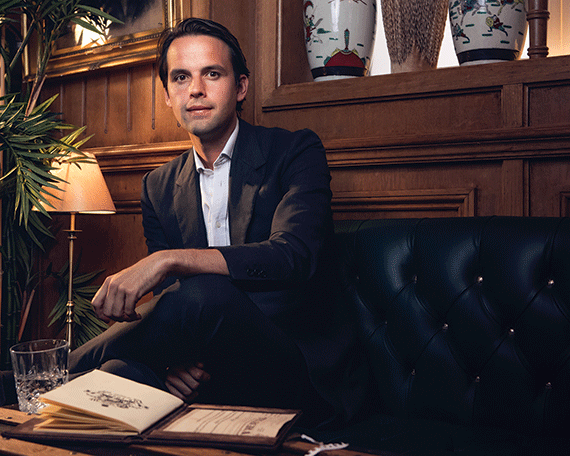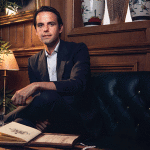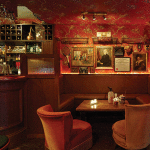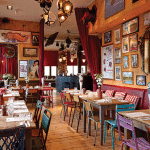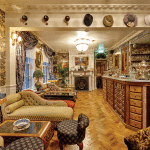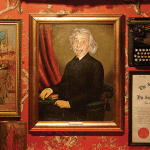Charlie Gilkes knows how to spin a bad location. In fact, he has built a hospitality empire worth £13m on the concept of the right postcode on the wrong street.
“We have always gone for buildings that no one else wants,” he says. “Properties that have been on the market for ages. That no-one else would touch with a barge pole.”
This unusual strategy has worked wonders for the 31-year-old entrepreneur’s portfolio of themed bars. After starting out launching Barts – a speakeasy in a residential apartment block in Chelsea – back in 2009, Gilkes and his business partner Duncan Stirling embraced the fact that they did not have the capital, reputation or traction to target prime locations and turned it into their USP.
“We saw all the negatives that put everyone else off venues off the beaten track and turned them into one big positive – selling them as ‘secret locations’,” he says.
Now the duo behind the Inception Group are responsible for eight venues across London, including Italian-themed pizzeria and karaoke bar Bunga Bunga, 1980s-themed nightclub Maggie’s, Mr Fogg’s Residence in Mayfair and the newly launched Mr Fogg’s Tavern in Covent Garden.
Now that the group is finally in a strong enough position to start targeting prime locations, Gilkes reveals what’s next for the company and how he will maintain the air of mystery that has proven so successful.
Postcode lottery
Anyone who has been to Mr Fogg’s Residence – where Gilkes has chosen to be interviewed – will know that if there was ever an example of his “right postcode, wrong street” analogy, this is it.
A stone’s throw from Berkeley Square, W1, and some of the most prestigious bars – and clientele – in the city, the bar itself is down a bleak backstreet lined with service entrance doors and littered with piles of rubbish.
And it is not as though the venue itself was a diamond in the rough when one of Gilkes’s team spotted it back in 2011. More like an old, boarded-up Irish pub in a 1950s building with low ceilings and a dark, dank interior. But this is where Gilkes’s vision comes in.
“This sort of strategy takes a lot of perseverance,” he says. “We spent two-and-a-half years negotiating for the pub. And then had to completely redo it to turn it into what it is today. We know it worked because people who come here usually assume this has always been a huge, old Victorian building with high ceilings. But the wood panels are fake and we knocked out the old ceiling. We have faked it all. The whole process of going for these sorts of sites is labour intensive. The venues are often not in great shape, no-one knows where they are, there is no passing trade.”
But, with the right marketing, it works. Something Gilkes and Stirling discovered out of necessity rather than choice back in 2009 when they opened Barts. Gilkes had been studying three days a week at university in Edinburgh and spending the other four in London running club nights – which is how he met his now business partner – and once he had graduated the pair were desperate to find a London venue of their own. “Back then we had basically no budget,” he says. “And beggars can’t be choosers.
“The venue that became Barts had been on the market forever. We decided to go for and use the slightly unusual venue to create a speakeasy. We did it on a shoestring, for around £40,000, by maxing out our credit cards.”
And it was not even the moment the pair were signing the documents to personally guarantee the lease that Gilkes remembers as being the most terrifying.
“One evening quite late, about a week before we opened, I went to the residential block where the venue was,” he says. “There was no-one around for miles. The entire area was deathly quiet and then this old lady shuffled past me on her Zimmer frame. And I thought, ‘What the hell are we doing?’”
But the secret venue concept and the unusual location were an instant hit. The bar was packed to capacity within a week and has been ever since.
Now, six years and eight venues on, the Inception Group has finally managed to land its first prime street. Mr Fogg’s Tavern on St Martin’s Lane, WC2, opened in October and is also the group’s first daytime venue. But could such visibility do more harm than good? It is difficult to bill something as a secret location when it is slap bang in the middle of one of London’s busiest streets.
In the shop window
“It is great to finally have a central location,” says Gilkes. “You can’t deny that in terms of footfall. But we are not moving away from the off-the-beaten-track concept completely. Plus, the Covent Garden venue has an upstairs gin parlour and salon accessible only via a side entrance and a hidden doorbell, so there is still a degree of having to be in the know to unlock all the elements.”
The hope is that having such a prominent “shop window” outlet will encourage landlords to work more closely with the Inception Group as they look to expand in London and beyond. Gilkes is now looking into venues in Notting Hill and the City as well as further afield in Edinburgh and Manchester and possibly even overseas.
“If we do look at global opportunities it would probably have to be with a hotel group,” he says. “I have heard too many horror stories of people becoming too ambitious and taking their eye off the ball in their home territory.”
For now the focus is firmly on London where the group is looking to work closely with innovative, creative landlords to launch venues for Londoners as well as tourists.
“There are some great landlords like Shaftesbury and CapCo that are building a more eclectic, interesting London,” says Gilkes. “We would love to work more with them. We are not a big chain. And I do get the appeal of working with those types of companies that have very deep pockets. But I hope we would be perceived as less of a risk now than we were six years ago.”
An important progression, given the aggressive competition for each and every site. “Off-market opportunities are sometimes the only way to get a look in,” says Gilkes. “Recently, by the time sites get to market we are not only competing with all the other London operators but also with the UK operators looking for flagships in the capital and the overseas groups that want a London foothold.
“But I like to think we can offer a lot of value. Look at this building [Mr Fogg’s Residence] we are in now. We greatly improved it and actually kick-started the regeneration of Bruton Lane. There is now a restaurant going in next door and there are plans for more, I believe. Plus we really, really protect our licence. Mr Fogg’s Residence just had a pub licence when we took it over. We extended it to 1am and now, thanks to a clean bill of health, have extended it again to 2am. Which will obviously add to the value of the property long-term.”
Avoiding Disneyfication
In terms of longer-term goals, Gilkes and Stirling hope to one day own some of their properties and see returns based on asset value as well as the business itself.
Until they have built up the capital to make this a reality, Gilkes says the pair will continue to focus on fresh concepts as well driving forward an expansion of the Fogg’s and Bunga Bunga brands. But design and interiors down to the minutiae of detail will not be compromised as the group expands.
“It is important for us to obsess about every single thing in each of our venues,” says Gilkes. “Everything in here is from the right era,” he adds, waving a hand around the Residence. “I can tell you exactly where each item is from because we found it all ourselves. We spent months getting up very early and going to car boot sales, Kempton market, scouring eBay. With themed bars like this everything has to be authentic, carefully sourced. Otherwise the concepts can become faddy.
“We had to be very careful it didn’t become too Disney. Most people probably wouldn’t even notice all the hand-picked elements in here. But that is not really the point. When you are consistently on the wrong street in the right postcode, what you are giving customers has to be absolutely perfect.”
Paying homage to a cultural icon through interior design choices requires serious dedication to the cause.
Hidden away down a Mayfair backstreet, Mr Fogg’s Residence is packed full of paraphernalia to create the perfect cultural shrine to Britain’s best-known and most eccentric fictional explorer, Phileas Fogg.
Bar owner Charlie Gilkes selects his favourite pieces from around the bar.
• The hot air balloon. Often when I go down to Kempton market I meet a lot of dealers who don’t have what I want, but they can go and find it. And I wanted a hot air balloon. Someone tracked the basket down. It needed six of us to carry it in and we had to remove part of the wall. The ceiling had to be reinforced. Then an artistic director designed the balloon around it.
• The penny farthings above the bar. One came from Kempton market and the others came from a guy who dug them up in his garden in Essex and put them on eBay.
• The grandfather clock, again bought on eBay. A family friend who is a clock enthusiast fixed the pendulum for us. We have to wind it once a week and it seems to keep pretty good time. Phileas Fogg was obviously all about
being on time. Which is why this place opens at 16:01 rather than 4pm. We make a bit of a thing about it.
• The snow shoes, which are from a car boot sale. I think I paid £20 for them. But they are so perfect hidden away around the corner in the bar.
• These elephant feet are not real. I had them shipped over from the States and they almost got confiscated by Customs. Realistic, yes. Which is good. But not real.







